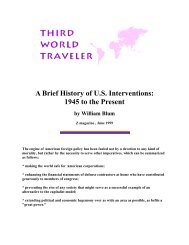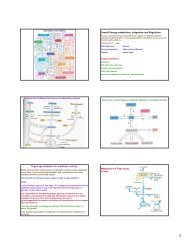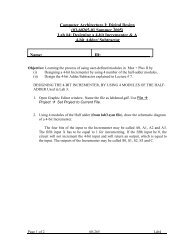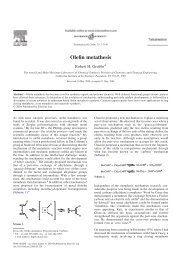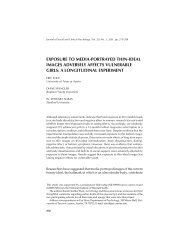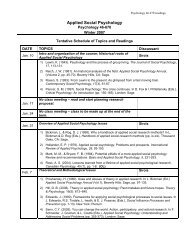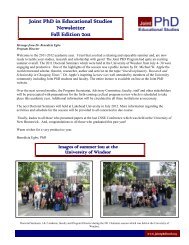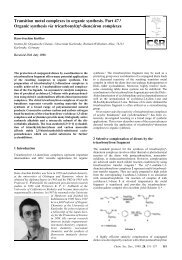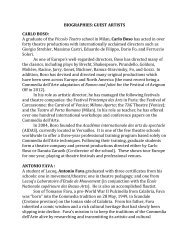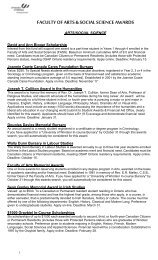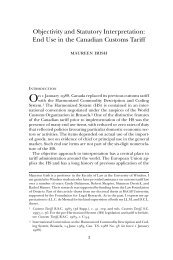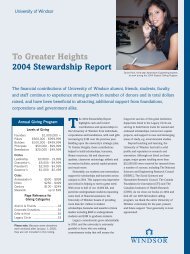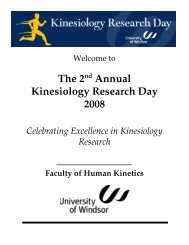Critical Social Work - University of Windsor
Critical Social Work - University of Windsor
Critical Social Work - University of Windsor
You also want an ePaper? Increase the reach of your titles
YUMPU automatically turns print PDFs into web optimized ePapers that Google loves.
Brown<br />
feminists emerged arguing for the integration <strong>of</strong> modes <strong>of</strong> reproduction and the<br />
acknowledgement <strong>of</strong> reproductive labour (Burstyn & Smith, 1985; Eisenstein, 1979; Hartmann,<br />
1975; Smith, 1977; Ursel, 1986). Subsequently, second wave feminism was critiqued for<br />
totalizing oppression to gender, although there were feminist theorists who did address class and<br />
sexual orientation (Snitow, 1983; Valverde, 1991; Vance, 1984). Following continued critiques<br />
<strong>of</strong> exclusion and representation and specifically <strong>of</strong> race, anti-oppressive perspective today shifts<br />
the emphasis to diversity and to the multiplicity and inter-sectionality <strong>of</strong> oppression. (Baines,<br />
2011; Barn<strong>of</strong>f & M<strong>of</strong>fatt, 2007; Flax, 1990; Mullaly, 1997, 2002, 2010). With these foci has<br />
come the need to acknowledge postmodernism in social work.<br />
Postmodernism has emerged over the past thirty years and is <strong>of</strong>ten thought <strong>of</strong> as a critical<br />
rejection <strong>of</strong> modernist foundations <strong>of</strong> knowledge. Truth or reality is seen to be socially<br />
constructed and thus shaped by social forces and as such what is typically considered truth or<br />
reality is called into question. Its influence on progressive thought has resulted in a rethinking or<br />
unpacking <strong>of</strong> central concepts, and the need to confront issues <strong>of</strong> inclusion, exclusion, diversity,<br />
essentialism and the foundation <strong>of</strong> what has been considered knowledge (Brown, 1994, 2001,<br />
2003; Butler, 1992; Chambon & Irving, 1994; Crosby, 1992; Di Stephano, 1990; Haraway, 1988;<br />
Nicholson, 1990; Riley, 1988, 1992; Scott, 1988; Spelman, 1988). Although this deconstruction<br />
<strong>of</strong> the relationship between power and knowledge or discourse has critical merit, it is <strong>of</strong>ten<br />
critiqued for its refusal to take a solid position on social issues (Brown, 1994; Ife, 1999).<br />
Within postmodernist anti-oppressive approaches to the social world, assumptions about<br />
neutrality and objectivity have been exposed as a fiction, masking the partial and located nature<br />
<strong>of</strong> all knowledge (Haraway, 1988). Falsely universalized and objectivist claims about social<br />
reality which have <strong>of</strong>ten upheld limited and privileged world views have been contested by the<br />
growing visibility and challenge <strong>of</strong> competing standpoints. In challenging the hegemonic<br />
knowledge base which has upheld the power and privilege <strong>of</strong> some at the expense <strong>of</strong> others, this<br />
approach deeply challenges the notion <strong>of</strong> universal truth and objective knowledge.<br />
While modernism and postmodernism <strong>of</strong>ten get presented as yet another oppositional<br />
epistemological construction, there is fluidity and overlap between them. Anti-oppressive<br />
discourse is ambivalently positioned in modernism, for although it rejects the idea <strong>of</strong> objective<br />
knowledge its commitment to social justice cannot rely on the relativism or lack <strong>of</strong> position <strong>of</strong>ten<br />
characterized by postmodernism (Brown, 1994, 2003, 2011; Healy, 2005; Ife, 1999). Instead,<br />
anti-oppressive discourse requires taking a stance which may sometimes involve the modernist<br />
ingredient <strong>of</strong> adopting a unifying vision; for example, the notion <strong>of</strong> social justice or antioppression<br />
itself (Brown & Augusts-Scott, 2007b). The focus on the local and subjective, and<br />
the uncertainty <strong>of</strong> social life, make it difficult to sustain a broad scale vision for social change<br />
(Healy 2005). Some have argued that postmodernism is dangerous for critical social work as it<br />
not only has little vision for social change, it tends to be negative, and it comes about at a time<br />
when issues <strong>of</strong> identity and category have taken center stage and the focus on deconstruction is<br />
likely to shift away from those conversations (Brotman & Pollack, 1998).<br />
Despite these critiques I concur with Hick and Pozutto (2005) that a blending <strong>of</strong><br />
the strengths <strong>of</strong> modernism and postmodernism will best challenge social oppression:<br />
<strong>Critical</strong> <strong>Social</strong> <strong>Work</strong>, 2012 Vol. 13, No. 1<br />
39



